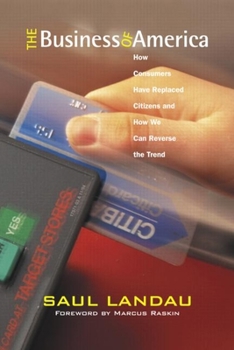The Business of America: How Consumers Have Replaced Citizens and How We Can Reverse the Trend
Select Format
Select Condition 
Book Overview
When President Bush promoted shopping as a patriotic duty, the American culture of consumption hit a new low. But a quiet revolution is growing in the developing world and in a new generation of Americans, fighting the advance of the shopping malls and the desolation they leave behind. Written by one of the most insightful critics of American commercialism, The Business of America probes the forces that have transformed citizens into consumers eager to take as much as they can from the planet. From on-line shopping to spectator sports to the cash-and-carry ethos of political campaigns, Saul Landau decodes the subtle ways in which advertising images tell us to correct our inadequacies with more things: SUVs, credit cards, air conditioning, video games. The winds of change are blowing, Landau shows, from resurgent student protests for underpaid janitors to the Group of 21, the developing countries that stopped the World Trade Organization dead in its tracks in 2003. Eschewing nostalgia for a simpler time--a less-interconnected world that can never return-The Business of America shows how we as citizens can regain our identities, stripping away the plastic overlay of consumerism.
Format:Paperback
Language:English
ISBN:0415944694
ISBN13:9780415944694
Release Date:June 2004
Publisher:Routledge
Length:216 Pages
Weight:0.65 lbs.
Dimensions:0.6" x 5.5" x 8.3"
Customer Reviews
1 rating
A Timely Manifesto for Change--and an Entertaining Read
Published by Thriftbooks.com User , 20 years ago
Landau's THE BUSINESS OF AMERICA, a complementary follow-up to his 2003 work, THE PRE-EMPTIVE EMPIRE (a bold and witty collection of diary-like entries chronicling the lingering parallels, contradictions and dramatic shifts in U.S. foreign policy under President George W. Bush before and after the 9/11 attacks), succeeds in once again providing the public with a much needed context for decoding the current political, socioeconomic and environmental dimensions behind one of America's favorite exports, the culture of consumption, or shopping. More precisely, Landau observes, the habitual and seemingly unconscious usage of the accountants' term `bottom line' by President George W. Bush, college professors, students and others alike "symbolizes contemporary values. Advertisers attempt to convince each `consumer' that he or she is and should be the focus of attention and as such can overcome the severe inadequacies from which he or she suffers by buying something, at the mall or online" (p. 2). Spend a few minutes channel surfing through the barrage of "plastic surgery changed my life--and left me looking totally unrecognizable" reality TV shows (like ABC's "Extreme Makeover" and Fox's "The Swan"), interspersed with commercials selling "new and improved" SUVs and shampoos and the frenzied news flashes about the latest sex scandal, to recognize, as Landau pointedly does in Chapter 3 ("Sheep Don't Need Whipping: Media in the Twenty-First Century"), how the mainstream media's reinforcement of individualism and consumerism plays a role in distracting citizens from thinking about the more crucial issues of their time--including the ongoing resistance in Iraq, worldwide proliferation of terrorism, growing unequal distribution of wealth in America and abroad and environmental degradation. What distinguishes THE BUSINESS OF AMERICA from the flock of pretentious, dust-collecting "cultural studies" books on the same subject is its broad scope, sense of humor and conversational-like quality. Indeed, Landau analyzes President Bush's promotion of shopping as a spiritual value (following the 9/11 attacks, W urged Americans to shop and travel to Disney World) and consumerism's correlation to his political values (Chapter 1, "The Bush Vision: A Bipolar Political Disorder") and justification for waging war against Iraq (Chapter 5, "The Iraq Conundrum); the prevailing national security culture in Washington (Chapter 2); and Nature's response to congested freeways, gus-guzzling vehicles and developers' encroachment on public land (Chapter 4, "At Two with Nature"). In particular, Landau's unlikely pairing of essays on Las Vegas as epitomizing Bush's America and a wedding celebration in Havana stand out as effectively dramatizing one culture's celebration of easy money with that of an anti-global economic model neighbor's embrace of an educated, healthy and socially-conscious public. Ultimately, Landau challenges readers with a lingering question: What is the meani





